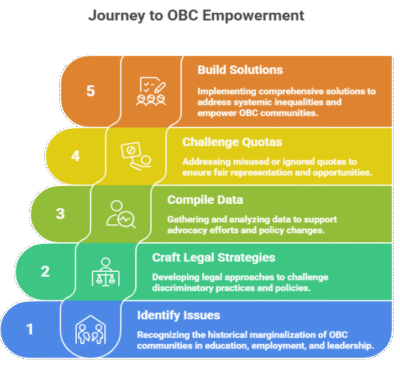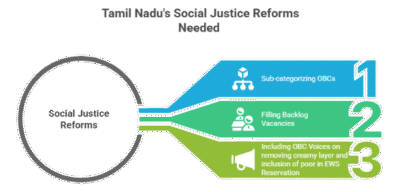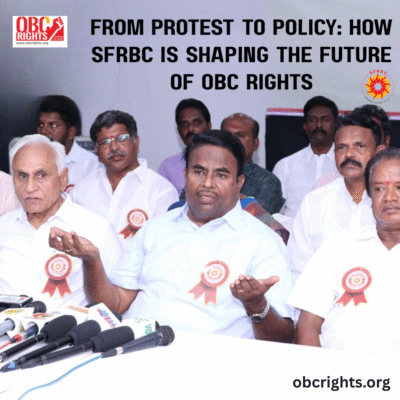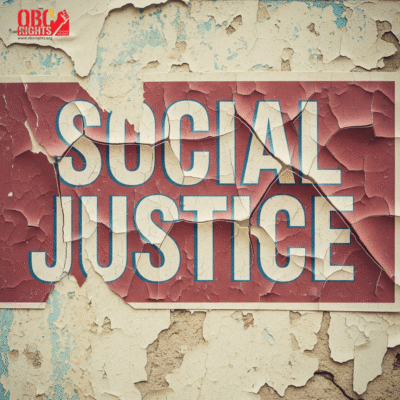There is a paradigm shift in the mode of struggle for the rights of OBCs. No longer limited to street demonstrations and political catchphrases, the movement in Tamil Nadu and across India is becoming more organized, evidence-based, and solution-oriented. At the forefront of this new wave is the Society for the Rights of Backward Communities (SFRBC)—a non-political body turning frustration into focused reforms and marginalization into measurable change.
SFRBC: Breaking the Silence, Building the System
For generations, OBC communities have been sidelined in education, employment, and leadership roles. Rather than waiting for justice, SFRBC has taken up the mantle of change. It operates not just in public spaces but also in courts, policy forums, and bureaucratic channels.
While many continue to protest, SFRBC crafts legal strategies, compiles critical data, and challenges misused or ignored quotas. It’s an organization focused on building solutions—not just amplifying problems.

Vanniyar Quota Ruling: A Cautionary Tale for Reservation Policy
A key moment came with the introduction of a 10.5% internal reservation for the Vanniyar community, which was later struck down by the judiciary. This wasn’t just a legal setback for the Rulers—it was a broader reflection of flawed policymaking.
SFRBC had already pointed out the lack of transparency and warned that selective benefits could fracture OBC unity. The lesson was clear: reservation policies must be inclusive, transparent, and just—or risk causing division instead of justice.
Why India Needs a Comprehensive Caste Census:
Among SFRBC’s top priorities is a nationwide caste census—a move they argue is critical for ensuring fairness. Without accurate demographic data, OBC representation in jobs, education, and governance remains unverified and unaccounted for.
In Tamil Nadu, where OBCs make up over 75% of the population, their actual representation in central government positions, premier institutes like IITs and IIMs, and the judiciary remains disproportionately very low.
SFRBC is pushing for:
- Caste-wise audits in education and employment
- Live tracking systems to monitor reservation implementation
- Transparent recruitment and selection mechanisms
- Removing the Creamy Layer – enhancing the income limit for scholarships.
This isn’t about public perception—it’s about factual justice.
The Crisis of Unfilled OBC Seats: A Youth Betrayed
Every year, a large number of reserved government posts and educational seats meant for OBC youth remain vacant. SFRBC’s investigations have uncovered a web of systemic barriers:
- Lack of awareness
- Intentional access delays
- Prejudiced selection processes
- Misapplied creamy layer rules
- Unjustifiable EWS Quota.
To combat this, obcrights.org —SFRBC’s digital platform—offers knowledge, legal tools, training, and real-time updates. It is more than an information portal, it’s a Launchpad for OBC empowerment.
Tamil Nadu’s Social Justice Model: Time for a Reset
Although Tamil Nadu is known for its progressive approach to social justice, recent trends suggest the need for urgent reform. SFRBC is calling for bold, immediate steps:
- Immediate State Restricted Caste Survey to comply with the Constitution (One Hundred and Fifth Amendment Act).
- Sub-categorizing OBCs to ensure fairer distribution of benefits
- Filling up backlog vacancies across public departments
- Including OBC voices in the judiciary, media, and corporate leadership
These aren’t demands for favors—they are calls for equal access and constitutional fairness.

No More Waiting Rooms: It’s OBC Youth’s Time Now
The fight for OBC rights is no longer reactive—it is strategic, sustained, and rooted in justice. Movements like those led by SFRBC and platforms like obcrights.org prove that true reform isn’t born from resistance alone—but from relentless research, legal precision, and public accountability.
OBC youth shouldn’t have to keep proving they deserve a seat at the table.
Now, it’s the system’s turn to prove it believes in real equality—not just on paper, but in everyday policy and opportunity.



